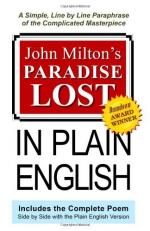|
This section contains 6,608 words (approx. 23 pages at 300 words per page) |

|
SOURCE: "Milton," in The Renaissance and English Humanism, University of Toronto Press, 1939, pp. 101-29.
In the following essay, Bush analyzes the influence of Christian humanism on Milton's poetry.
It may be more candid than diplomatic to acknowledge at the start that admirers of Milton have always been, consciously or not, on the defensive. They certainly must be nowadays, when for the first time since the seventeenth century Milton has ceased to be an active force in poetry. We may think that modern poets could still learn something from him, and if the poets thought so too we might be spared some headaches. But, so far from being an influence in contemporary work, Milton is damned as the man who crushed the fruitful metaphysical movement and kept poetry in bondage for three centuries. Mr. Eliot has even complained of Milton's obscurity. One may have, as I have, a great...
|
This section contains 6,608 words (approx. 23 pages at 300 words per page) |

|


